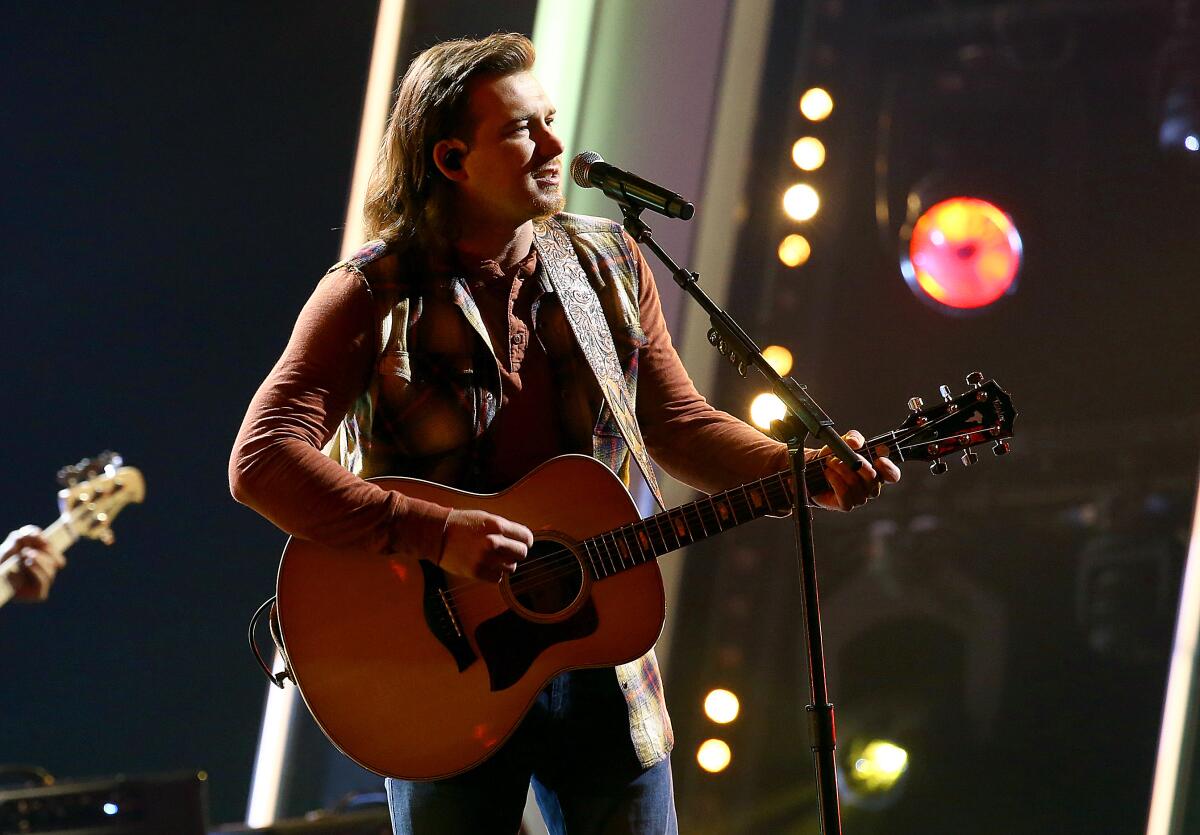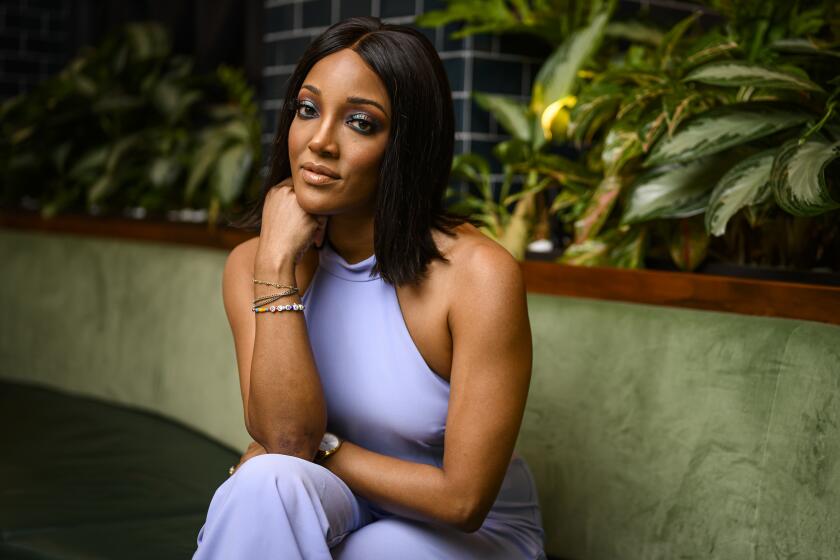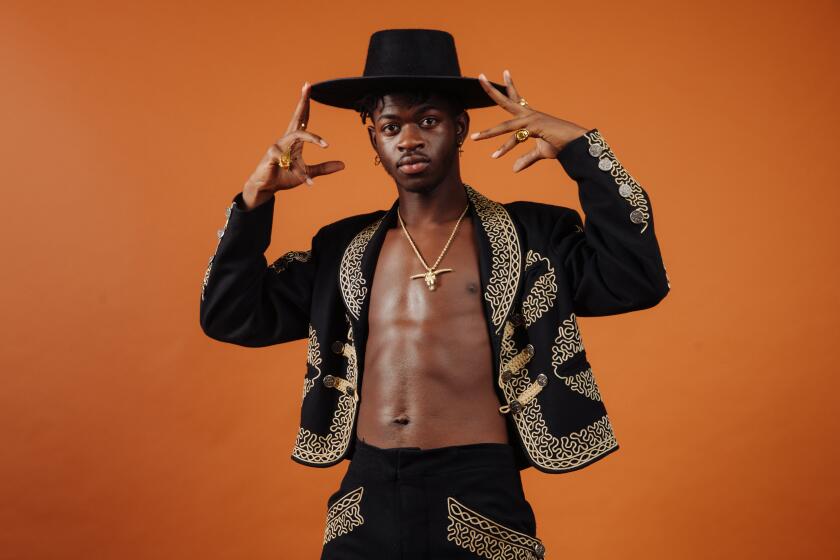Nashville has punished Morgan Wallen. But country music’s reckoning with racism awaits

- Share via
NASHVILLE — “To no consequences!” Morgan Wallen said during an appearance on “Saturday Night Live” back in December, raising a bottle of beer in a skit about taking a warning from his future self, courtesy of host Jason Bateman. The joke was that Wallen, country music’s fastest-rising star, had been invited back after he was kicked off a prior episode for violating COVID protocol — i.e., making out with girls at a bar unmasked and getting caught on camera doing so. Here he was, in the most coveted spot on television, getting a second chance.
This past weekend, Wallen was caught on camera again, this time by a neighbor’s Ring camera, using a racial slur outside his home in the Berry Hill area of Nashville. And this time, he woke up to consequences: The video was leaked to TMZ, and in less than 24 hours Wallen’s music was pulled from rotation by radio conglomerates iHeartMedia, Cumulus, Cox Media Group, Entercom and Beasley Broadcasting — a major blow to any artist, but particularly for country artists, who are dependent on the support of country radio. His label, Big Loud, suspended his record contract. Cable network CMT is “in the process of removing his appearances from all our platforms,” as is the Country Music Assn. His songs have been removed from curated streaming playlists on Spotify and Apple Music, though his music remains available on the platforms. The Academy of Country Music halted his eligibility for awards and “will expedite the offering of long-planned diversity training resources.” And Billboard reports that his booking agent, WME, has dropped him from its roster.
“His recent behavior is not in keeping with standards expected in society,” says Nate Deaton, general manager of KRTY-FM (95.3) San Jose. “We are suspending all airplay at this time.”
A backlash is ballooning against Morgan Wallen after the popular country music artist was recorded shouting a racist slur outside his Nashville home.
It’s a notable and swift shift for an industry that had, just a day before, elevated him to the very top of the Music Row pyramid. Wallen, 27, was breaking records with his “Dangerous: The Double Album,” with three consecutive weeks at No. 1 on the all-genre Billboard 200 chart and 240 million streams in its first week. It was organic to some degree, but also came with unparalleled support: He had the muscle of a partnership between his Nashville label, Big Loud, and the New York-based home to Taylor Swift, Republic Records, as well as almost universal media coverage — everything from Pitchfork to that appearance on “SNL.”
For many within Nashville, his ascent to superstar was both perplexing and not: He’s a fine singer and a good writer within a particular canon, but he also fit perfectly into the mold of star that Music Row has been producing and supporting nearly since inception, but doubled down on in the last 20 years. And that’s a formula of white men in denim — Luke Bryan to Luke Combs to, now, Morgan Wallen — singing about small-town life, a formula that leaves out Black artists, women and even left of center musicians like Tyler Childers.
“I’m embarrassed and sorry,” Wallen said in a statement after the video was posted. “I used an unacceptable and inappropriate racial slur that I wish I could take back.” Wallen had been used to apologizing by now — even before Tuesday, and before “SNL,” he had been arrested for public intoxication and disorderly conduct.
“I think he’s gotten away with more than any artist who’s not a straight white man ever could,” says singer-songwriter Kalie Shorr. “Careers have been lit on fire for much less.”
Wallen’s career is certainly afire, but “suspended” from his label is not “dropped,” noted one longtime music industry executive. “Proudly declaring you’ve ‘suspended’ someone ‘indefinitely’ from their record contract is not exactly the powerful statement Big Loud thinks it is,” said the executive, who asked to remain anonymous to speak freely. “There’s nothing Nashville loves more than a cash cow, so I’m fully expecting to see Big Loud recording artist Morgan Wallen performing a tearful acoustic comeback single on the 2022 CMA Awards. There won’t be a dry eye in the house, and everyone will pat themselves on the back for steering his redemption.”
Indeed, “suspended” leaves plenty of room for a redemption tour, which men in country music have often been afforded without any work toward recourse: Jason Aldean was caught cheating on his wife, and wearing blackface, and is still one of the biggest stars in the genre. When songwriter Dallas Davidson said similar slurs on camera in 2014, he found himself right back on Luke Bryan — and Wallen’s — records with barely a discussion. Abe Stoklasa, a songwriter, says that he once heard another male artist casually lob the N-word in the studio while “rapping on a microphone as a joke and dropping the word like it was nothing over and over.” For Stoklasa, and for Black artists like Grammy nominee Mickey Guyton who just have to glance at their mentions online to see similar language, the shocking part was that none of it was shocking at all.
Mickey Guyton is an outlier in Nashville: Black, female and, at age 36, about to release her long-awaited debut album. “I started speaking my truth,” she says.
“I was more annoyed at the ‘This is not us’ talk than I was him saying the word,” says singer-songwriter Rissi Palmer. Palmer, who is Black, is referring to a social media post sent by country star Kelsea Ballerini that defended Music Row: “The news out of Nashville tonight does not represent country music,” she wrote.
“I’m used to that, unfortunately,” Palmer adds. “The systematic racism is what keeps artists of color out. It’s what enables behavior like Wallen’s past and present actions. Sure, Wallen was stamped out for now, what about the label heads that won’t sign artists of color or LGBTQ+ artists? What about the radio stations that only play a limited amount of songs and all those spots go to white men? That’s the bigger work. That’s the bigger picture.”

Non-male artists, and non-white ones, are rarely offered the grace Wallen has received in his short career. Mindy McCready was dropped (not suspended) after a series of public bouts with alcohol and drugs; LeAnn Rimes was pushed out of the genre for committing the same extramarital “sin” as Aldean; Palmer lost her label for failing to sell the same number of records as white artists who walk in with a massive advantage. The Chicks, perhaps most famously, were expelled from the airwaves for voicing their opinions about George W. Bush.
“Sadly, [men] fail upward or are rewarded for bad behavior because that’s the way it’s always been,” says Charese Fruge, owner of MC Media Consulting. “White men with issues become outlaws. Everyone else gets blacklisted,” says a spokeswoman for the anonymous advocacy collective WOMAN Nashville.
“The problem is with the programmers who claim racism has no place at their stations but still won’t add Mickey Guyton,” says former country program director Christal Blue. “If a programmer quietly pulls Morgan Wallen today but makes no public statement about their station not tolerating the behavior, they remain complicit. There are too many in country radio who are afraid to piss off the GM, the concert promoters, label reps, their audience and especially their advertising clients.” Guyton, who has been in Nashville for a decade and is up for a Grammy this March, has released just one EP, while Wallen’s second album contained nearly 30 songs.
Randy Brooks, a programmer at Missouri’s KIX 102.5, still won’t play the Chicks. He’s not spinning Wallen right now either, though that directive comes from the top. When he polled his listeners on-air, he said “the overriding opinion was that no one should be ultimately judged because of youthful indiscretions.” Wallen is 27.
Still, the penalty Wallen is facing — permanent or not — is notable for a genre that prefers to adhere to a “no politics” mantra when it comes to everything from #MeToo to COVID-19 to Black Lives Matter. “This incident demonstrates the importance of speaking out forcefully against racist incidents and systems,” says Charles Hughes, author of “Country Soul: Making Music and Making Race in the American South.” “The claim that we all just need to come together and get along, or that country artists shouldn’t be political, just isn’t good enough.”
Some executives in town, like publisher and entertainment consultant Tracy Gershon, are ready to break that pattern. “[Music Row] always says, ‘Oh, this is bad, but it will go away in a couple of weeks,’” Gershon says. “This is the day we say no more. No more, not ever, not again. I have respect for many members of [Wallen’s] team, but they have to look at themselves. It’s hard to give up a paycheck, but something has got to give.”
Even those outside of the country music community are fed up. “Let’s be clear,” says “A Thousand Miles” singer-songwriter
Vanessa Carlton, who, until recently, lived in Nashville. “It’s all the white men who have been in charge of these radio stations and labels for a long, long time. They protect the cancer because they are the cancer.”
That doesn’t mean it can’t be cured: Country music has a whole subgenre of songs about redemption. But it means tackling the deeply embedded racism within its institutions head-on. “Time will tell in his actions if he’s grown,” says Palmer, who hopes Wallen is seeking counseling or rehab. “He wasn’t sentenced to death. He can still make music. He can still go out and play if he wants to. He’s been given the Chicks treatment. They survived and came back stronger than ever. Wallen can choose how he comes out of this.”
Wallen has not disappeared entirely — on Thursday, “More Than My Hometown” topped the list of the 10 most popular songs on iTunes, followed by six other Wallen cuts. He also held multiple spots on its album chart, with his new release, “Dangerous: The Double Album,” leading the way. Some in conservative media have even coalesced around him: Fox Nation host Tomi Lahren asked if “this is just another cheap thrill for the woke keyboard crowd.”
But most Nashville observers support Wallen’s punishment. “I haven’t heard a single person who thinks it was excessive,” says one radio programmer. “I’m betting spins will be at or near zero by the end of week.”
Although many of the genre’s women and Black artists, including Guyton, Palmer, Maren Morris and Cassadee Pope, have condemned Wallen’s actions, as of press time, only a few major-label male country artists have done the same, including the group Old Dominion and singer-songwriter Charlie Worsham.
“What happened is inexcusable, horrific, wrong on so many levels,” Worsham told The Times. “But we know that already, and there is no amount of tweet shaming or PR apology posting or industry self-correction that’s going to fix the root of the problem. The root of the problem is that racism operates in deep and complex ways, and if we are going to make things better, we — specifically white people and white dudes especially — must be willing to take action on a personal level. I’m a white dude from the Deep South, and I am here to say that change is possible.”
Another headline-grabbing episode proves, in some ways, that’s true. T.J. Osborne, of the Grammy-nominated duo Brothers Osborne, came out on Wednesday as gay in Time magazine. He’s the first major-label male country star to do so, and it’s a momentous step for an industry still facing a deep reckoning with race and inclusivity.
“I am so happy and proud of [T.J.],” says singer-songwriter Miko Marks. “We are living in the best of times and the worst of times.”
As Osborne’s friend and longtime equal-rights advocate Kacey Musgraves said in Time, “Country music deserves a future even more honest than its past.”
More to Read
The biggest entertainment stories
Get our big stories about Hollywood, film, television, music, arts, culture and more right in your inbox as soon as they publish.
You may occasionally receive promotional content from the Los Angeles Times.











